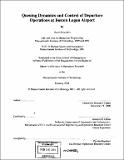Queuing dynamics and control of departure operations at Boston Logan Airport
Author(s)
Idris, Husni Rifat
DownloadFull printable version (6.187Mb)
Other Contributors
Massachusetts Institute of Technology. Operations Research Center.
Advisor
Amedo R. Odoni.
Terms of use
Metadata
Show full item recordAbstract
The Departure Planner (DP) is a concept for a decision-aiding tool that is aimed at improving the performance of departure operations at major congested airports. In order to support the development of DP tools and other improved methods for departure operations, this thesis is an effort to gain a deep understanding of the underlying dynamics of the departure process based on field observations and data analysis conducted at Boston Logan International Airport. It was observed that the departure process is a complex interactive queuing system and a highly controlled system as the air traffic controllers manage the traffic. Based on these observations, a core departure process abstraction was posed which consists of a queuing element that represents the delays and a control element that represents the air traffic controller actions. Namely, the abstraction represents the control element by blocking the flow of aircraft in order to maintain the safe operation of the airport resources according to the A TC rules and procedures and to regulate the outbound flow to constrained downstream resources. Based on this physical abstraction, an analytical queuing framework was posed and used to analyze the departure process dynamics under different scenarios: the overall departure process between pushback and takeoff, departure sub-processes between controller/pilot communication events and under the effect of downstream restrictions. Passing was used as a manifestation of the control behavior, where passing results mainly from sequencing of aircraft and their suspension under special circumstances such as downstream restrictions. Insights about the departure process queuing dynamics and control behavior are discussed. In particular it was observed that at Logan airport there is a high level of uncertainty and a limited level of sequencing control, hindering the ability of the air traffic controllers to manage the traffic efficiently and in compliance with restrictions.
Description
Thesis (S.M.)--Massachusetts Institute of Technology, Sloan School of Management, Operations Research Center, 2001. Includes bibliographical references (p. 91-95).
Date issued
2001Department
Massachusetts Institute of Technology. Operations Research Center; Sloan School of ManagementPublisher
Massachusetts Institute of Technology
Keywords
Operations Research Center.